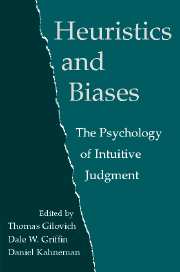Book contents
- Frontmatter
- Contents
- List of Contributors
- Preface
- Introduction – Heuristics and Biases: Then and Now
- PART ONE THEORETICAL AND EMPIRICAL EXTENSIONS
- PART TWO NEW THEORETICAL DIRECTIONS
- PART THREE REAL-WORLD APPLICATIONS
- 33 The Hot Hand in Basketball: On the Misperception of Random Sequences
- 34 Like Goes with Like: The Role of Representativeness in Erroneous and Pseudo-Scientific Beliefs
- 35 When Less Is More: Counterfactual Thinking and Satisfaction among Olympic Medalists
- 36 Understanding Misunderstanding: Social Psychological Perspectives
- 37 Assessing Uncertainty in Physical Constants
- 38 Do Analysts Overreact?
- 39 The Calibration of Expert Judgment: Heuristics and Biases Beyond the Laboratory
- 40 Clinical versus Actuarial Judgment
- 41 Heuristics and Biases in Application
- 42 Theory-Driven Reasoning about Plausible Pasts and Probable Futures in World Politics
- References
- Index
37 - Assessing Uncertainty in Physical Constants
from PART THREE - REAL-WORLD APPLICATIONS
Published online by Cambridge University Press: 05 June 2012
- Frontmatter
- Contents
- List of Contributors
- Preface
- Introduction – Heuristics and Biases: Then and Now
- PART ONE THEORETICAL AND EMPIRICAL EXTENSIONS
- PART TWO NEW THEORETICAL DIRECTIONS
- PART THREE REAL-WORLD APPLICATIONS
- 33 The Hot Hand in Basketball: On the Misperception of Random Sequences
- 34 Like Goes with Like: The Role of Representativeness in Erroneous and Pseudo-Scientific Beliefs
- 35 When Less Is More: Counterfactual Thinking and Satisfaction among Olympic Medalists
- 36 Understanding Misunderstanding: Social Psychological Perspectives
- 37 Assessing Uncertainty in Physical Constants
- 38 Do Analysts Overreact?
- 39 The Calibration of Expert Judgment: Heuristics and Biases Beyond the Laboratory
- 40 Clinical versus Actuarial Judgment
- 41 Heuristics and Biases in Application
- 42 Theory-Driven Reasoning about Plausible Pasts and Probable Futures in World Politics
- References
- Index
Summary
Accurate estimates of the fundamental constants of physics, such as the velocity of light or the rest mass of the electron, are central to the enterprise of science (Pipkin & Ritter, 1983). Like any measurements, they are subject to uncertainties from a variety of sources. Reliable assessments of this uncertainty are needed (1) to compare the precision of different measurements of the same quantity; (2) to assess the accuracy of other quantities derived from them; and, most crucially, (3) to evaluate the consistency of physical theory with the current best measurements. Thus, as Eisenhart pointed out, “A reported value whose accuracy is entirely unknown is worthless” (1968, p. 1201).
It is not unusual to encounter individual examples of errors in measurements of physical quantities that turn out to be disconcertingly large relative to the estimated uncertainty. One well-known case was in Millikan's oil-drop experiment in 1912 to determine e, whose result turned out 15 years later to be off by 0.6%, or three standard deviations, due to reliance on a faulty value for the viscosity of air (Cohen, Crowe, & Dumond, 1957). A more recent example concerns measurements of |v+-|, the parameter that measures the degree of violation of CP (charge–conjugation–parity) invariance. The six measurements prior to 1973 agreed reasonably, but more accurate measurements since then differ consistently by about seven standard deviations from the pre-1973 mean, a discrepancy that remains unexplained in terms of experimental procedure (Franklin, 1984).
- Type
- Chapter
- Information
- Heuristics and BiasesThe Psychology of Intuitive Judgment, pp. 666 - 677Publisher: Cambridge University PressPrint publication year: 2002
- 8
- Cited by



